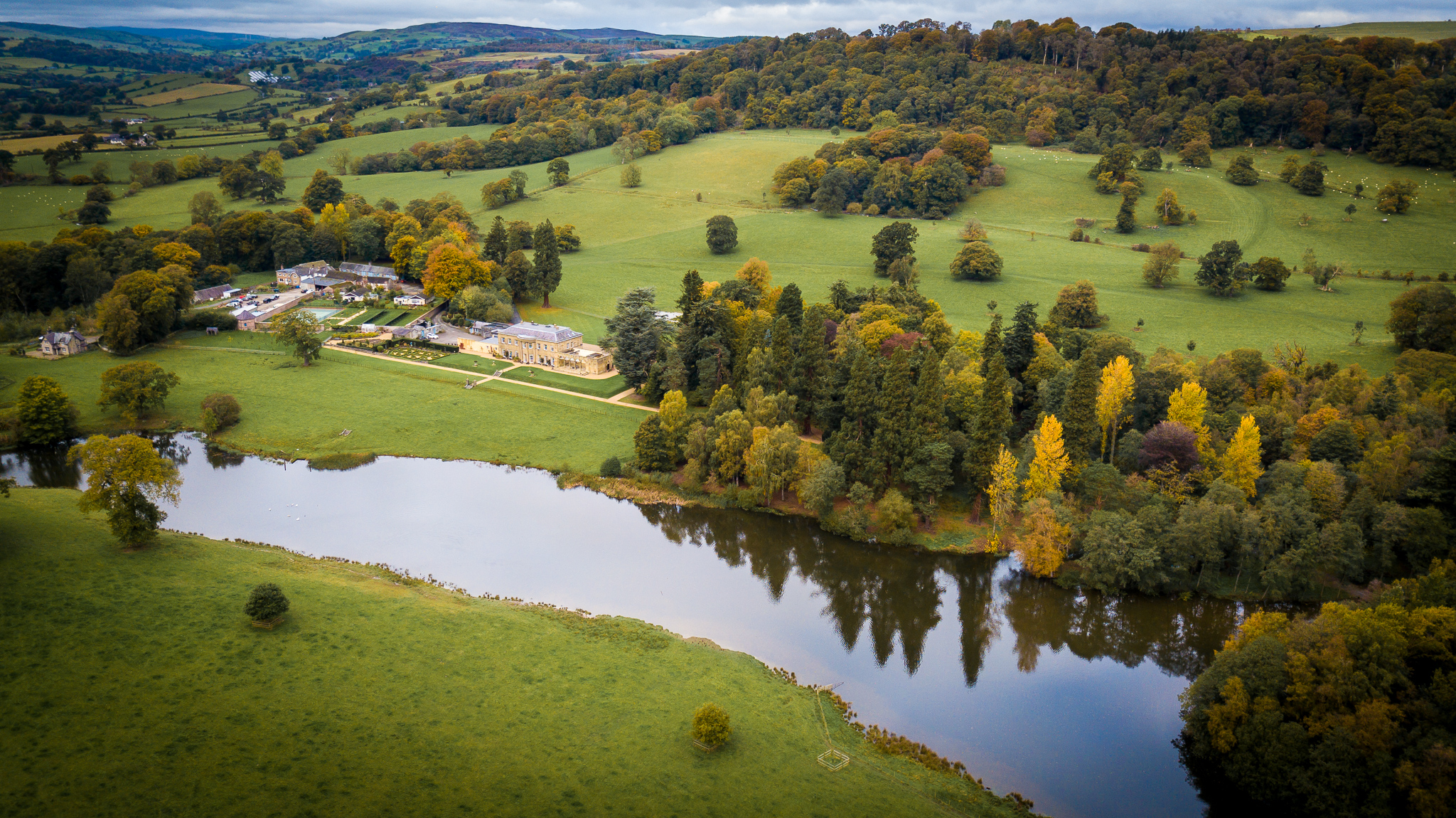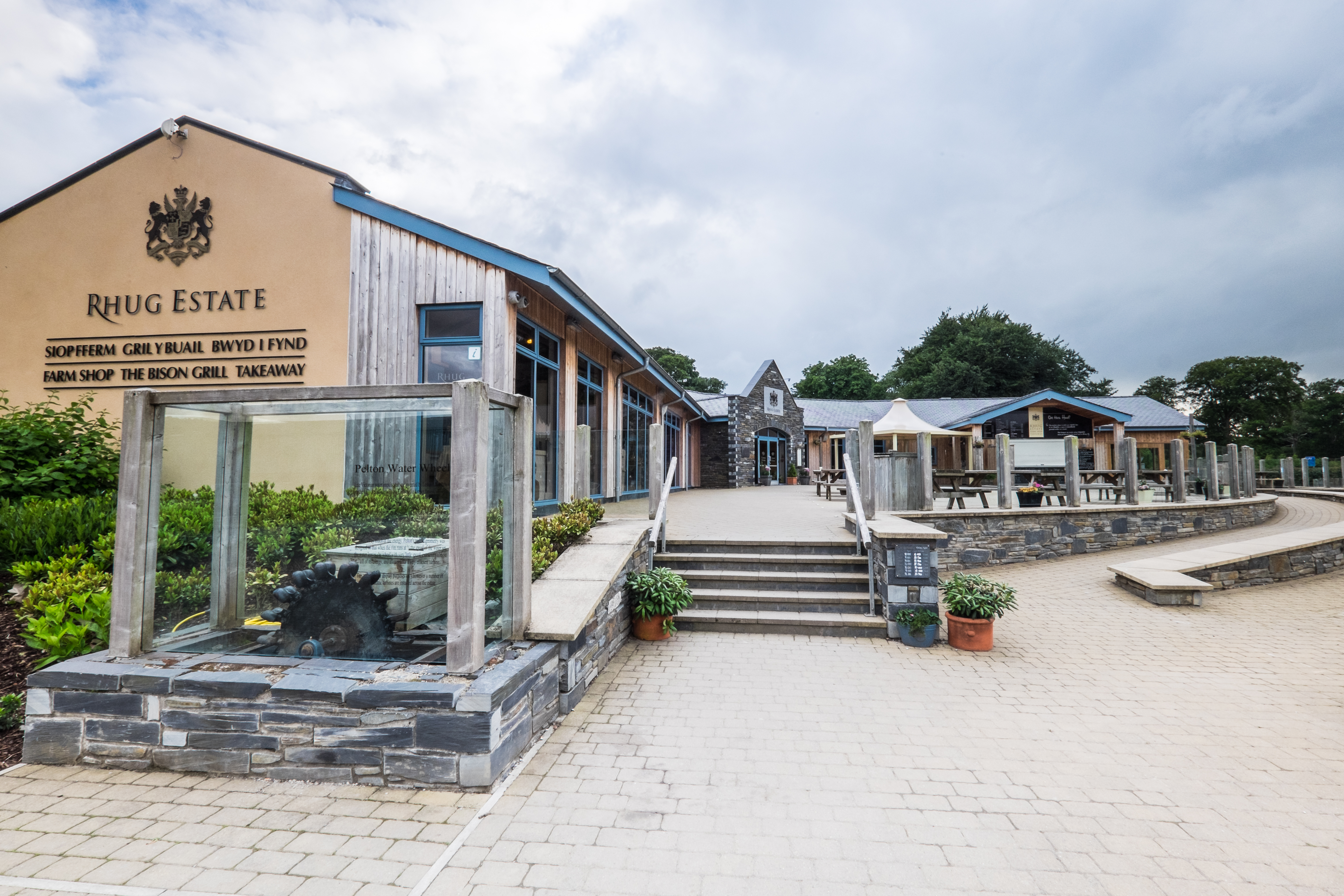Free digital copy
Get Speciality Food magazine delivered to your inbox FREE
Get your free copy
We talk a lot in artisan food and drink retail about innovation. The trailblazers who’ve pushed the envelope on everything from product development and protecting the environment, to attracting and retaining shoppers in ever new and exciting ways.
A business that can certainly be folded into the mix, considered one of the most forward-thinking of the last three decades, is the Rhug Estate.
Set in the undulating rural idyll of Corwen, North Wales, the estate is a remarkable feat, combining multiple successful shopping and dining operations with running the organic farming business, spanning 12,500 acres.

Lord Newborough took over Rhug in 1998 following the passing of his father, leaving no stone unturned in his mission to drive forward welfare and the environment, ensuring the ongoing health of its animals, land and people.
The entire team shares a commitment to organic practices. No sprays are used. Livestock are not routinely given medication, grazing on lush organic pastures. And every decision made, whether around farming, or retail, adheres to Lord Newborough’s blueprint for sustainability.
Managing director, Amy Coleman, is rightly proud of what the business has to offer, and the way the Rhug Estate has continually developed and diversified into the strong proposition it is today.
Like many other success stories, this one started small. Following organic certification, Lord Newborough was looking for ways to sell the estate’s meat (bison, beef, chicken, lamb – and now venison) setting up a burger van and butchery van in the car park.
“But we outgrew those very quickly!” Amy says, adding they’d sell out of pretty much everything by mid-morning. Clearly there was an appetite in this corner of Wales for premium, thoughtfully-produced food.
A larger unit was opened soon after (today the estate’s conference room) offering passersby a small farm shop with a proper butcher’s counter but, again, due to demand this was replaced in 2012 by a much bigger farm shop. Today, the Rhug Estate enterprise encompasses a cafe and takeaway, play area, farm walk, drive-thru and (new this year) a huge covered dining terrace and ice cream parlour.

Sustainability (and using organic and local produce as far as possible) has been essential for Rhug Estate Farm Shop’s growth. Not only are a range of renewable energy sources, from solar and wind turbines to ground source heat pumps and hydro power, in use across the business, but its own packaging is recyclable or compostable, and a great deal of time goes into sourcing from like-minded producers. More than 3,500 items are stocked in the farm shop, with the buying team looking first for organic, then local, then Welsh food and drink.
“The message of ‘local’ is incredibly important to us,” says Amy. “It really is at the heart of what we do here. Obviously sometimes we have a challenge finding organic products nearby, and we have to work out whether it’s worth shipping products in, or shopping more locally to support nearby businesses and keep our carbon footprint low.”
Customer favourites include the perennially popular Snowdonia Cheese Co truckles, and Caws Cenarth, maker of Perl Las, Perl Wen and Golden Cenarth cheeses.
“We’ve got pies from Treflach Farm just down the road, some jams and chutneys from Ffynnon Beuno Preserves, and products from Daisy Bank Dairy. Wales has so many fantastic products, covering such a wide selection,” Amy adds. “The landscape is brilliant here for food and drink producers.”
She’s especially keen to promote Welsh wine, which is starting to make itself known on the wider UK and international stage. “We’re seeing a lot more of it becoming available, and three of the ones we’ve got in stock have won gold and silver awards, which just goes to show how good the wine being produce here is,” Amy continues. “Vale Vineyard is just half an hour down the road from us and we love having those stories to tell, especially because we’re a tourist destination. We get a lot of passing traffic from Liverpool, Birmingham and London, and customers love it when we can tell them about products made on or so close to the estate.”
At the beating heart of the farm shop, and where everything began, is the butchery counter, championing the estate’s own meat, operating alongside a deli counter brimming with homemade pies and sausage rolls, which continue to be bestsellers.
There has been a defined uptick in sales in this department according to Amy, who thinks shoppers are putting more and more trust in independent retailers as they increasingly look at the health implications of what they’re eating. “I think they are becoming more conscious and careful about what they eat. They’re aware of the quality of what they buy, especially since the Pandemic. Health has become a huge focus, more than it ever has been before. Shoppers want to know where their food comes from, the story behind it, and that it doesn’t contain additives.”
The Rhug Estate has been firmly ahead of the curve across multiple parts of the business, and one of the most visible reminders of its future planning and forward thinking was in the creation of the UK’s first on-farm drive-thru. Opened in 2018 it initially sold farm produce, becoming a fully-fledged drive-thru food outlet later – leading where others in the retail and hospitality industries would later follow during Covid lockdowns.
Giving travellers and local people a quick and healthy option - something different to the usual highway and motorway service stations and fast food joints - was the thinking behind this new addition, as was the opportunity to upgrade infrastructure for the future, adding in 16 high-powered EV charging points.
“We are off the A5, linking to all sorts of destinations, and people often don’t have time to go out looking for somewhere to eat and drink,” Amy explains. “We’ve become a part of their journey, selling light bites (from organic bacon rolls to toasties), teas, coffees and soft drinks. It really came into its own during Covid. We found customers wanted to get out of the house, and we were still able to serve them, which was great. The charging points help too. They are 24 hours and there’s not many of them around here. We’ve definitely seen an increase in visitors thanks to those.”

To thrive, today’s farm shop needs to do more than sell food and drink, as demonstrated at the Rhug Estate. A popular part of any visit is brunch or lunch in the cafe, which had operated as a restaurant until pivoting after the Pandemic, when the team realised the offering wasn’t quite right. Being able to hold your hands up and say ‘this isn’t working’ is crucial, Amy adds.
“We wanted to be able to offer more of a cosy cafe feel than a formal restaurant,” she says. “We weren’t open in the evenings, and the restaurant, we felt, was more of an evening dining experience. What we found was that people coming here wanted a light lunch - something nice, quick, easy and tasty – so we made that decision for it to be a cafe, so it could be less formal and cheaper. Where dishes before were £15 to £25, now it’s much more accessible and better used.”
The cafe has become renowned for its Welsh rarebit, sitting on the menu with homemade quiches, eggs Benedict, jacket potatoes and more, using homegrown and local organic produce.
The Rhug Estate is a ‘triple threat’ on the food scene, because as well as the cafe and drive-thru, visitors will find the On the Hoof takeaway, harking back to the farm shop’s humble beginnings, offering burgers, bacon rolls and other bites to-go, or to eat on the terrace or outdoor heated dining area.
There’s a large play area for children too. And a farm walk of about 45 minutes, taking shoppers on a circuit around the fields where they can meet the estate’s resident animals.
Another string to the estate’s bow is events, which across the industry now no longer nice-to-haves, but must-haves.
“They’re something we’re focusing on a lot more here,” Amy says. “Going forward we’ll have craft fairs in the summer and winter, we’ve got a Santa’s grotto, pumpkin picking, dog shows. These are things that don’t cost too much, but bring people here and give them something to do. I think a big part of farm shops and their continued success is creating reasons to visit beyond retail. Make their visit an experience. Build in an activity and they will shop and eat with you while they are on site.”
Having a ‘multi-dimensional’ offering will set you up for success adds Amy, but farm retailers must also keep up with what shoppers want and need, and adapt quickly. “Hence us changing the restaurant to a cafe. To survive, farm shops should focus as much as possible on local, unique products people can’t find when they go to the supermarket and want something different. Change up the offering regularly so they will always find something new and exciting!”